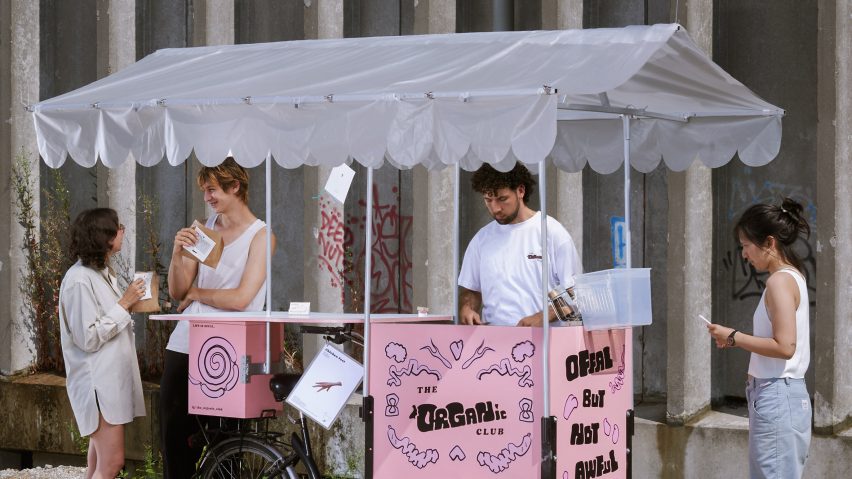Design Academy Eindhoven graduate Ziyi Lian has created a street food stall to investigate why animal organs are rarely consumed in western Europe.
The ORGANic Club is a mobile stall that serves offal-based dishes, including intestine sandwiches and liver salads.
Lian designed the stall to double as a research centre, with dishes that reference different histories and cultural practices of offal cuisine from around the world.
She hopes to take it to street food markets across the Netherlands to challenge why many people are willing to eat some parts of an animal and not others.
"The main goal of this project is to unpack the complexity and diversity of narratives about offal," Lian told Dezeen.
"By bringing offal-based dishes and informative stories about them into public spaces, the stall becomes a research tool to generate stories, conversation and self-reflection."
Lian grew up in China, where offal is widely consumed. When she moved to the Netherlands to study at Design Academy Eindhoven, she was shocked to discover that offal cuisine here was rare and hugely contentious.
"Everyone in my family loves offal," she stated. "My mother told me that she put chicken liver in my food as a supplement when I was a baby."
"I was curious to learn how offal cuisine could become almost extinct in certain cultures."
The ORGANic Club's dishes, developed with help from chefs, reference the various myths and stories Lian heard from people when she asked them about offal.
Some people told her they believed it was "peasant food" or "dog food", while others suggested it was more of a delicacy. Some also questioned whether offal, which is rich in nutrients, might be bad for their health.
Lian hoped to stimulate more informed conversation around the consumption of animal organs.
One dish, called the Caveman Salad, highlights how offal is sometimes associated with ancient wisdom. The dish is based on the Paleolithic diet, combining nuts and seeds with liver.
"I encountered so many different and contradictory narratives," Lian said.
"I wanted to encourage people to reflect on how their ideas about offal are formed or manipulated so that they can make up their own minds about their food choices."
The ORGANic Club was in action at the Design Academy Eindhoven show during Dutch Design Week and has also appeared outside the school for a few test runs.
According to Lian, the reactions were widely varied and sometimes surprising.
"What I didn't anticipate was that the project would attract a large number of elderly people. They often spoke with nostalgia about their early years and the farms of the time," she said.
The stall connected her with other offal lovers who have become friends and attracted a young fanbase who became repeat customers. It also provoked interesting reactions from vegetarians.
"Even though they would probably never eat offal, they were able to understand my project and position with an open mind, rather than shutting down the discussions," Lian said.
The designer hopes to be able to take her food stall to other locations but has faced some obstacles in making it possible.
"Due to regulatory issues, the food stall can only be conducted as an experimental pop-up event for design research," she explained.
To overcome the licensing issue, Lian is considering options for partnering with an established restaurant or kitchen. She is also interested in producing a cookbook where she can share her stories.
"I want to continue to collect information and stories, and present them in the form of experimental cooking and writing," she added.
Lian graduated from the Social Design MA course at Design Academy Eindhoven.
Other DAE graduate projects from this year include a mobile kit for turning unused plots into playgrounds and a digital dress made of social media noise.

